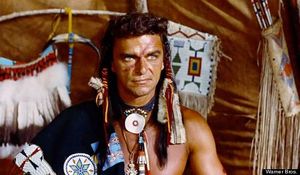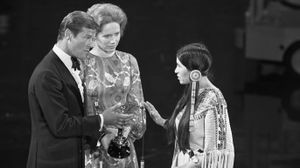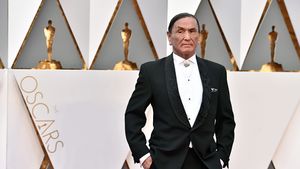Issue of Indigenous Representation in Hollywood
Introduction
In our modern era, with mainstream media impositions at an all-time high, there is an obvious strong social influence provided by and reflected upon Hollywood. With recent movements, like #MeToo and #OscarsSoWhite, it is clear that many people look up to the stars of Hollywood in order to feel represented and heard. Evidently, this realm of Hollywood makes no attempt at conserving opinionated views. However, during this moment of vocalization for change, there is still a lack of Indigenous representation within Hollywood. Through the means of stereotypical representations, cultural appropriation, or a complete absence of Indigenous employees within this film industry, it is obvious that the Indigenous community has been abused and neglected throughout the history of Hollywood.
Hollywood's History of Lack of Representation
Throughout Hollywood’s history, Indigenous communities have experienced mistreatment either within the workplace or through the inaccurate and offensive stereotypes. In terms of working in the industry, historically it has been proven that “even as movie extras, [Indigenous employees] earned lower pay than non-Indians and had little job security” (Rosenthal, 2005).[1] Even while agreeing to work in these films, it is evident that Indigenous communities did not have much input, hence the blatant stereotypes which persisted. Some of these stereotypes include the bloodthirsty beast and the noble savage*. “The bloodthirsty savage is a vicious, animalistic beast, attacking white men and kidnapping white children. The noble savage is a wise, exotic being unfettered by society and at one with nature (Boyd, 2015) [2]. In Hollywood films, Indigenous people are then seen through “the gaze of the empire/national narrative” (Adah, 2015). [3]
Whitewashing in Hollywood Examples

| Movie | Actor | Role |
| The Lone Ranger (2013) | Johnny Depp | Tonto |
| Pan (2015) | Rooney Mara | Tiger Lily |
| The Unforgiven (1960) | Audrey Hepburn | Rachel Zachary |
| Apache (1954) | Burt Lancaster | Massai |
| Winchester (1950) | Rock Hudson | Young Bull |
| The Searchers (1953) | Henry Brandon | Chief Scar |
| Outrageous Fortune (1987) | George Carlin | Indian scout |
| The Legend of Walks Far Woman (1984) | Raquel Welch | Sioux warrior |
Indigenous Presence at Annual Award Shows
It has been common throughout Hollywood’s history for actors and filmmakers to use their position of privilege and power to give a voice to marginalized individuals, promote specific activist groups, or simply state certain political claims. Many actors have stirred up controversy during Hollywood’s most prestigious events, specifically the Golden Globes and The Academy Awards. It is essential to note that though the number is quite small in retrospect, there has been some Indigenous actors nominated in categories of these prestigious award shows. However, it is obvious to note the lack of representation and recognition made by the academy. There have been a few non-Indigenous actors who are able to recognize this unfair representation and take a stance in hopes for a change of attitude towards Indigenous communities in the film industry.

One of the most famous instances of this was at the Academy Awards in 1973 when Marlon Brando won best actor for the film “The Godfather.” Brando proved to be an activist for Indigenous people as he openly supported protests, including the occupation of Alcatraz Island and Wounded Knee. In preparation for this win, Brando chose to avoid the award show and asked Apache actress, Sacheen Littlefeather, to reject the award on his behalf. He did this to protest the mistreatment and underrepresentation of Indigenous people in the film industry. This speech caused plenty of backlash, and regretfully made it difficult for Sacheen Littlefeather to work as an actress following this show.
Another actor who used his position of power recently was Leonard DiCaprio, during the 2016 award season in which he was nominated for "The Revenant." In his acceptance speech at the Golden Globes, DiCaprio made the effort to share his award with the First Nations people involved in the film. He spoke to the Indigenous audiences worldwide and told them that "it is time that we recognize your history and that we protect your Indigenous lands from corporate interests and people that are out there to exploit them. It is time that we heard your voice and protect this planet for future generations." [6]

Duane Howard, an Indigenous Canadian actor, also used the help of DiCaprio's position of privilege to allow for representation at the 2016 Academy Awards. Howard was initially not invited to the award show despite his involvement acting in the film which was nominated for several awards. According to a Haida designer, Dorothy Grant, Howard "approached Leonardo Dicaprio to demand an invite, arguing the need to have indigenous representation at the Oscars." He told DiCaprio that he was "sharing this award with First Nations, Native Americans and the indigenous people of the world." [7] DiCaprio then assured Duane Howard with an invitation to the prestigious event that so blatantly ignored his presence.
Potential for Positive Change in Hollywood
With the praise for inclusion rider to be implemented in films, hopefully, there will be an increase in representation in Hollywood. New projects like the 2017 film, Wind River, demonstrates this push for representation and inclusion of Indigenous people within films as well as knowing their stories are worthy. Hiring actual Indigenous actors portraying real emotions and showing them as more than a stereotype is a step in the right direction for Hollywood. There are so many important stories that are already theatrical involving Indigenous communities, movements, and activism. Time is breaking down these racial prejudices and slowly making room for representation to exist within Hollywood.
Current Indigenous Filmmakers
- Alanis Obomsawin (Abenaki): documentary filmmaker, her work for the National Film Board of Canada won her the Order of Canada and international recognition
- Victor Masayesva (Hopi): photographer and filmmaker representing Indigenous power in visual storytelling
- Sandy Osawa (Makah): the first Indigenous filmmaker in America to be hired for mainstream television for "The Native American Series"
- George Burdeau (Blackfoot): the "first Native American member of the Directors Guild of America" and director of the National Center for the Production of Native Images
References
- Rosenthal, Nicolas G. Representing Indians: Native American Actors on Hollywood's Frontier. Western Historical Quarterly, vol. 36, no. 3, 2005, pp. 328-355. http://www.jstor.org.ezproxy.library.ubc.ca/stable/pdf/25443194.pdf?refreqid=excelsior%3A902bf8db3319abec21e838bf63411aee
- Boyd, Julia. An Examination of Native Americans in Film and Rise of Native Filmmakers. The Elon Journal of Undergraduate Research in Communications, vol. 6, no. 1, 2015, pp.105-113. https://www.elon.edu/u/academics/communications/journal/wp-content/uploads/sites/153/2017/06/10BoydEJSpring15.pdf
- Adah, Anthony. Special issue on Indigenous film and popular culture. International Journal of Media & Cultural Politics, vol. 11, no. 3, 2015, pp. 279-282. http://web.a.ebscohost.com.ezproxy.library.ubc.ca/ehost/pdfviewer/pdfviewer?vid=1&sid=b47e4bdf-b2fd-4b0d-8282-e4f4bdc6a7c8%40sessionmgr4009
- Butler, Monica. Guardians of the Indian Image: Controlling Representations of Indigenous Cultures in Television. The American Indian Quarterly, vol. 42, no. 1, 2018, pp. 1-42 http://muse.jhu.edu.ezproxy.library.ubc.ca/article/687490/pdf
- https://www.youtube.com/watch?v=2qHzoF9mIME
- http://www.huffingtonpost.ca/entry/white-actors-native-americans_n_4957555
- http://www.cbc.ca/news/indigenous/haida-designer-dresses-duane-howard-for-academy-awards-1.3466490
- Marubbio, Elise. Introduction to Native American/Indigenous Film. Literature Resource Center, vol. 29, no. 3, 2010. http://go.galegroup.com.ezproxy.library.ubc.ca/ps/retrieve.do?tabID=T001&resultListType=RESULT_LIST&searchResultsType=SingleTab&searchType=AdvancedSearchForm¤tPosition=1&docId=GALE%7CA247034905&docType=Essay&sort=RELEVANCE&contentSegment=&prodId=LitRC&contentSet=GALE%7CA247034905&searchId=R2&userGroupName=ubcolumbia&inPS=true